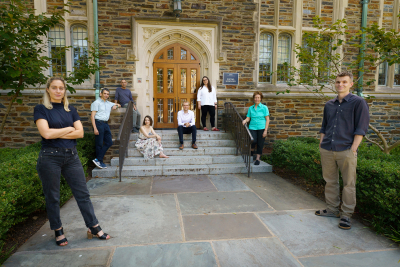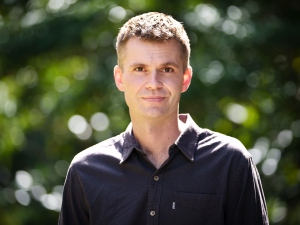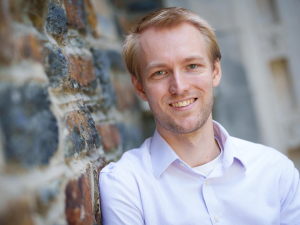Econ’s New Faculty Take a Multifaceted Look at Real-World Problems

Duke Economics prides itself on being where economics go far beyond finances, demonstrating just how multidimensional the discipline can be.
Under the leadership of James Roberts, professor of Economics and Econ’s Chair, the department has been focusing on showing students how economics applies to multiple disciplines. From reconfiguring Econ 101 to developing labs and mentorship programs, Duke Econ is committed to dispelling pre-conceptions about the discipline and showing students that economics are applicable to the real-world issues they’re passionate about.
Thanks to the department’s newest hiring initiative, Econ diversifies the range of real-world questions tackled by its faculty by welcoming Anna Bykhovskaya, Emily Cuddy, Jeffrey DeSimone, Gregor Jarosch, Ellen Meade, Laura Pilossoph, Michael Pollmann and Nelson Sá. This new cohort of faculty will expand the department’s strengths into the areas of decision making, policy, interpersonal behavior and the social world at large
“We are absolutely thrilled to welcome eight new faculty members to Duke and the department,” said Chair James Roberts. “This year marked one of the most ambitious hiring efforts in the department’s history.”
Bringing economic insight to policy questions
Ellen Meade comes with a formidable CV.
The research professor of Economics joins the department after a long career in policy and academia, most recently at the Federal Reserve Board in Washington D.C., where she was a special adviser to the Federal Reserve’s Vice Chair and a senior adviser in the Division of Monetary Affairs.
Meade’s research has focused on central banking and monetary policy, institutional governance and voting, and exchange-rate regimes. In addition to being a big name in the monetary policy world, Meade has also advocated for diversity in economics. In a recent working paper, Meade looked at the underrepresentation of women in economics and found that while representation has grown over time, it is still quite low.
Also in the policy world is new Assistant Professor of the Practice of Economics Nelson Sá.
His work analyzes spectrum allocation methods for telecommunications. Sá examines how FCC policies impact both the taxpayer and cellular customers.
In addition to his research, Sá will also direct and develop the Masters in Economics program. The role has personal importance for Sá, who moved to the United States to complete his doctoral work at Duke.
“It is a privilege to help new generations of students at Duke unlock all their potential,” he said.
Weighing in on social determinants
Instead of policy questions, Laura Pilossoph, assistant professor of Economics and Gregor Jarosch, associate professor of Economics, turn the economic lens to social issues.
Working together and separately, the married couple and research collaborators have most recently studied the effects of social distancing on workers, job seeking behavior in men and women, and the labor market. In a recent collaboration, the team looked at how employers discriminate against the long-term unemployed.
This is just one way they have examined the structure of our society.
Pilossoph describes herself as an applied macroeconomist with research interests in the economics of labor markets, marriage markets, consumption and their intersection. “I’m really looking forward to interacting with my Duke colleagues and students,” she said.
Jarosch’s research focuses on determinants of wages and employment in the labor market, examining questions like why unemployment leaves such a large scar on workers' future careers.
“My research spans several fields, and what's exciting about Duke is that it has economists with a broad range of expertise that share a focus on serious, data-driven research relating to important real-world issues,” he said.
Putting math to work
On the methodological and computational side of the discipline, you can find Assistant Professor of Economics Anna Bykhovskaya and Assistant Professor of Economics Michael Pollmann.
Seeking to combine her knowledge of mathematics with real-world problems, Bykhovskaya looks at things like the evolution of relationships across people or countries and long-run dependences among stock prices.
“My goal would be to find out whether we can devise a portfolio which has very different (and potentially better) properties compared to individual stocks,” Bykhovskaya said of some recent work.
Pollmann uses his background as an econometrician to develop methods that help other researchers learn from their data, providing an essential support for interdisciplinary research.
“I’m excited to start my faculty career in the Economics department at Duke because we have a large and vibrant department with faculty studying interesting and important topics,” he said. “Being around other researchers working on such questions is what inspires me to develop methods to help them find convincing answers.”
Making sense of drugs
The final two new hires share a background in drug research.
Emily Cuddy, assistant research professor, studies the prescription drug market, with an emphasis in adolescent mental health treatment. Cuddy has used insurance claims data to look at how children who are diagnosed with mental health issues receive treatment in different areas of the United States, and how failures to follow accepted medical guidelines lead to an increased cost of care.
Jeffrey DeSimone, professor of the practice of Economics, has studied reckless behavior in teenagers, looking at the consequences of drug and alcohol abuse. Drawing on the background of applied research, his main role within the department will be as director of the DEAL Initiative, which will offer undergraduates an opportunity to work alongside faculty and their research.
“I’m really looking forward to be on the front line, recruiting undergraduates and working with them to get them integrated into a research life at Duke,” said DeSimone.
Opportunities for years to come
The hiring committee carefully deliberated over this year’s new faculty cohort. Their philosophy was to find scholars who extend the departmental research network into new and exciting areas, while also connecting to the existing faculty in interesting ways.
“This year we prioritized several fields, especially econometrics and development economics,” said professor Patrick Bayer, a member of the hiring committee.
Roberts, the department chair, is looking forward to the expertise and experiences the new faculty bring. “Each of these scholars will impact the department in unique and important ways for many years to come,” he said.












